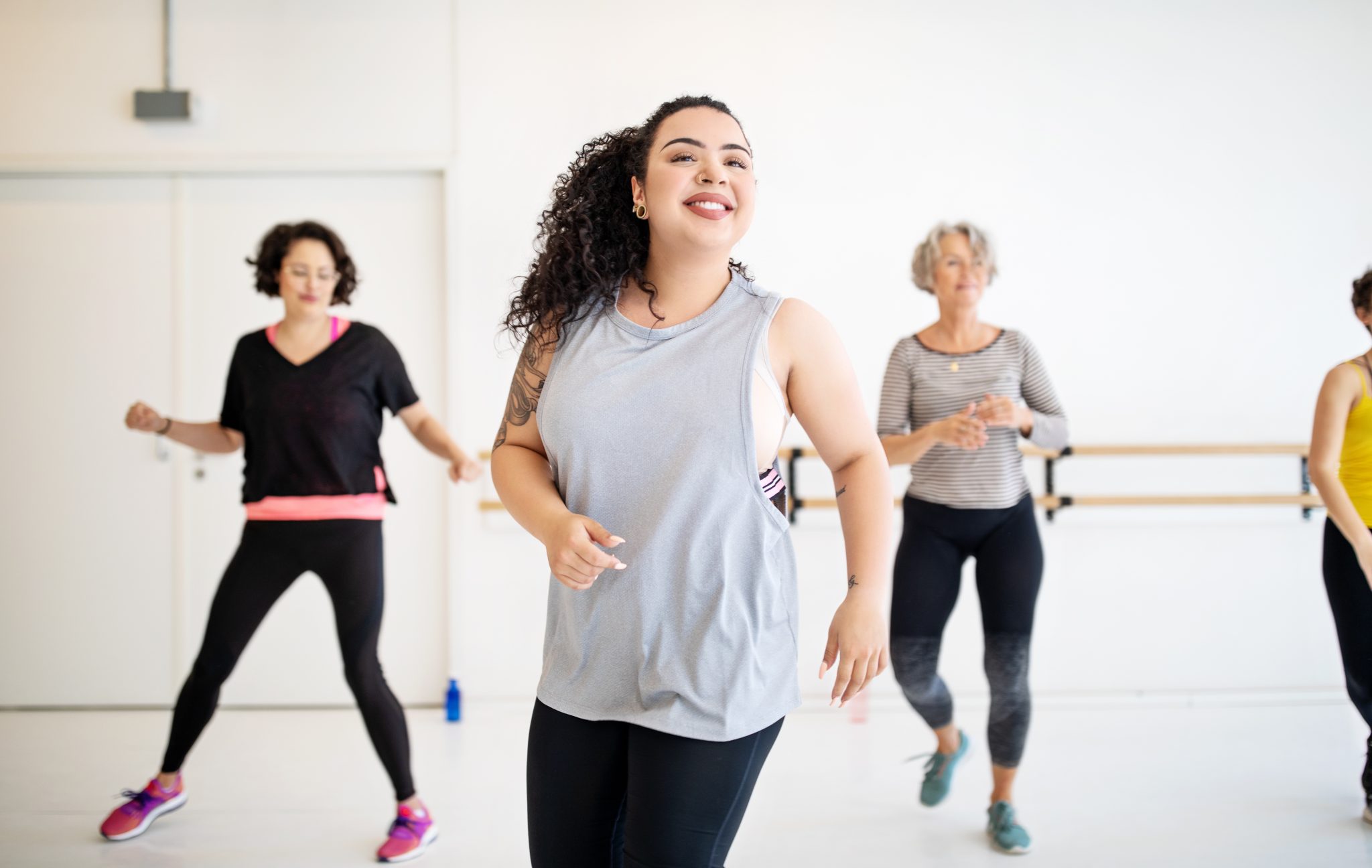
Women’s fitness levels have taken a hit during lockdown. This is why that’s a problem…
The gender gym gap was on the decline. In 2019, activity levels for women were at a record high, with 211,000 more women being active, according to Sport England. Campaigns like This Girl Can normalised movement for every gender and body type. Even Instagram, which rightfully gets a bad rap for the role it plays in diet culture, began to flourish as a space that encouraged intuitive movement, female confidence and discussing the benefits of sports. And then, lockdown happened.
“For all of us, there’s just been a massive disruption. But certainly, every piece of research shows that disruption is being felt more by women,” says Lisa O’Keefe, director of insight at Sport England. This also means that it’s our fitness levels that have been hit the hardest over the course of the coronavirus pandemic. Stats from This Girl Can, the campaign powered by Sport England, show that the gap, as its worst, has doubled from 4% to more than 10%, with only 30% of women doing the recommended amount of exercise a week over the past four months.
You may also like
Weight training: why is there still a gender gym gap?
Why is there a gender gym gap in lockdown?
Unlike what you might see on social media, not everyone has spent their time tracking runs on Strava or doing burpees while following along with an Instagram Live three times a day. If you are still working from home during the pandemic or working on the front line in a hospital, shop or restaurant, you’ll particularly know that your days are the exact opposite of that.
But even those on furlough or who are unemployed are facing barriers when it comes to their fitness, explains Lisa. “We need to stop this idea of ‘doing lockdown the right way’. Everyone is thinking that we have more free time and therefore will be the fittest we’ve ever been. That’s just simply not the experience that people are having,” she says. “If you haven’t got the same choices, access to the gym or the classes, the social group and the structure that you used to, you’ll probably be in a worse position because the motivation and opportunity just isn’t there.”
Even for those who are managing to find time or motivation to exercise, the amount and intensity of activity is probably lowered right now, Lisa points out. “Unless the activity you did prior to lockdown was walking, cycling or running, let’s face it, you’re probably going to be less satisfied with the activity that you can do during this time,” she says. “You’re not going to be able to do the same activity, you may not be feeling the same buzz or intensity from whatever you replace it with, you might have lost that kind of social group that you do it with and you might have lost that structure to your day.”

This is particularly true for women, who make up 80% of group exercise class participants, and list group motivation and the social aspect of exercise as a key way to get started. After all, there’s only so much enjoyment you can get out of a Zoom class, and that’s assuming people have access to these things.
Who is experiencing the gender gap the most?
No, it’s not just full-time worker, mothers and carers who’s exercise regime have taken a hit. There is a racial difference that is crucial to talk about, too. This relates to the fact that, pre-coronavirus, non-white women already had the lowest activity levels, and this has only been enhanced during lockdown, explains Lisa.
For example, according to This Girl Can, before lockdown 60% of women said they would feel anxious to exercise outside. That’s now dropped to 42% of women. That’s still higher than men, but it’s reducing, perhaps because we are having more experience with outdoor activities such as running, out of necessity. “However, when you look at Asian populations, that level of anxiety is back up into the 50s,” says Lisa. “If we’re already in a situation where there are fewer Asian or black African heritage women doing activity, and then you overlay anxieties about coronavirus, which are going to be enhanced amongst some ethnicities, then that again becomes a multiplier effect.”
Why does the gender gym gap in lockdown matter?
Generally, getting women moving is clearly important in order for them to reap the physical, mental and social benefits of exercise. And while 39% of women have said they are concerned they are losing their fitness and that this time off would have a long-term impact on their health, according to This Girl Can, we do need to point out recognise that four months out of the gym is not the end of the world.

However, there is a very real reason to be concerned about the shrinking number of women training, says Lisa. “One of my big concerns of this massive disruption to people’s behaviour is that it will exacerbate one the fears we know that are prevalent amongst women, which is a concern and anxiety about whether or not we’re able to do an activity.”
This was the foundation on which This Girl Can was made: their original research in 2014 found that 75% of women put off exercise for fear of what others think. With a large portion of people having decreased activity levels, the fear is that this judgement will be enhanced – we’ll be redder, more puffed out, picking up lighter weights, perhaps forgetting our perfect form. All reasons that we are lead to feel like we don’t belong in gym spaces.
You may also like
Gyms reopening: women discuss the future of fitness and if they will go back to the weights room
What can we do?
In terms of the industry, This Girl Can is encouraging gyms, sports clubs and fitness centres not to “assume that opening the door is going to be enough. They have to make sure that they are really welcoming, in terms of the environment that’s been created, which is going to be tough initially because of social distancing. They should be reassuring users about what the space will look like and what’s going to be expected of them to take all of those anxieties away before we get there.”
But for us, who are worried about going back to the gym floor, the pool or our netball team, the message is that we’ve been through a pandemic, and no one is expecting you to fly out of your house, into the gym and get back to hitting personal bests.
“You’re not the only one that feels like this. We all have a version of this, and it’s okay. It’s absolutely okay to have taken a little bit of time out for yourself,” says Lisa. “We need to continue talking about fear of judgement, concerns about ability, worried about fitting into fitness environments, about why it’s OK to take time out for ourselves. Some days we will find a way through those things, and other days we won’t, and that’s OK. This is not about putting even more pressure on ourselves.”
Follow @StrongWomenUK on Instagram for the latest workouts, delicious recipes and motivation from your favourite fitness experts.
Source: Read Full Article